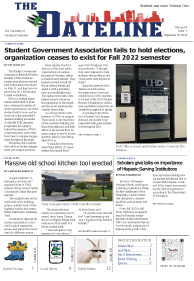Volume 69 Issue 3 Page 8 right-menu

Awareness, the first factor in accessibility equity equation
By Indira Zaldivar
The Office of Disability Services and Facilities Management collaborated on the large-scale installation of vertical accessibility bars for restroom doors in all campus buildings ahead of the fall semester.
The only restrooms with accessibility push bars were found on the third floor of the One Main Building. Personally, pressing the bar once requires much less effort than manually pushing or pulling doors open, especially when I am carrying something or avoiding surfaces for sanitary purposes.
More importantly, accessibility features and guidelines enable equal access, which are critical factors in the equity equation. Everyone should strive to learn and be aware of opportunities to include people with disabilities. Since the Americans with Disabilities Act of 1990, the civil-rights law has prohibited discrimination based on disability.
However, not all disabilities are visible. Assistant Director Nkechi Uchegbu of Disability Services explained how the accessibility press bars in restrooms provide fair access to someone with a disability or limited mobility.
“It can be a challenge when you’re trying to open a bathroom door if maybe your hands don’t work to the best of their ability or maybe you’re in a wheelchair,” Uchegbu explained. “You can’t necessarily grab the handle because your wheelchair is in the way.”
Uchegbu has served at UHD for a month but has worked in disability services for 15 years. She is passionate about disability services because her mom has a disability.
“I’m constantly looking around trying to ensure that she has access,” Uchegbu said.
For example, she said restaurants have often lacked a designated area close to the entrance to limit the amount of physical exercise a person with disabilities should exert before finding a table.
“That’s something I don’t think people are naturally mindful of.”
Uchegbu spoke more about ways the UHD community can be allies for people with disabilities. For one, she said it’s essential to review ADA and how it impacts those around you and yourself.
Second, she invites you to connect with people with disabilities. For example, suppose you have a classmate who is hard of hearing. In that case, you can always text them and take advantage of technology such as social media to connect.
“We’re conditioned to look at it one way when [technology] can be used in so many ways to make sure that we’re fully including everybody.”
Third, she said that accessibility comes from genuine kindness, like offering help. However, never assume someone with a disability needs your help.
“Ask them first before you decide to jump in and say, ‘let me help you.’”
Lastly, if you see any malfunctions in accessibility guidelines, make sure to report it to Disability Services. The office welcomes faculty, students, and staff to raise concerns and questions, provide accommodations, and ensure equal access for all Gators.
Comments or feedback? Contact The Dateline Editor at editordatelinedowntown@gmail.com
Submit Your News
Want to share some news? Have a hot news tip? Let us know what's going on!
Submit News

